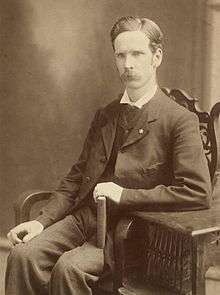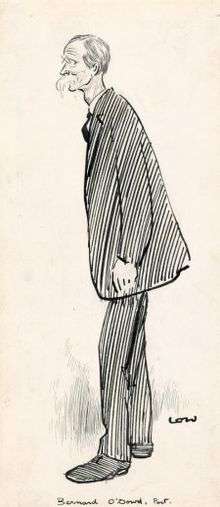Bernard O'Dowd
Bernard Patrick O'Dowd (11 April 1866 – 1 September 1953) was an Australian poet, activist, lawyer and journalist. He worked for the Victorian colonial and state governments for almost 50 years, first as an assistant librarian at the Supreme Court in Melbourne, and later as a parliamentary draughtsman.[1]
Bernard O'Dowd | |
|---|---|
 O'Dowd near age 38 | |
| Born | Bernard Patrick O'Dowd 11 April 1866 Beaufort, Victoria |
| Died | 1 September 1953 (aged 87) Melbourne, Victoria |
| Occupation | Poet, activist, lawyer and journalist |
| Language | English |
| Nationality | Australian |
| Years active | 1888–1953 |

Life and work
Bernard O'Dowd was born in 1866 at Beaufort, Victoria, as the eldest son of Irish migrants, Bernard O'Dowd and Ann Dowell.[1] He was a child prodigy who read Milton's Paradise Lost at age 8.[1] His first job, aged 17, was as head teacher at a Catholic School in Ballarat, but he was soon dismissed for heresy.[1] He then opened up his own school in Beaufort. In 1886, at the age of 20, he moved to Melbourne, and in 1887 took up a position as an assistant librarian in the Supreme Court Library. In 1913 he began a long career as a parliamentary draughtsman for the Victorian government, eventually retiring in 1935 as Chief Parliamentary Draughtsman.[1][2]
Over the years, O'Dowd's official career remained distinct from his poetic and political activities. Beginning in 1897 he was a co-publisher of the first issues of the radical paper the Tocsin, which was associated with the United Labor Party. He wrote a regular column in the Tocsin as 'Gavah the Blacksmith'. Active as a lecturer with the Victorian Socialist League from about 1900, he was a founding member of the Victorian Socialist Party (V.S.P.) in 1905, and in 1912–13 assisted with editing The Socialist. One of his colleagues in the V.S.P. was John Curtin, who later became Prime Minister of Australia. In 1912 he denounced the White Australia policy as being "unbrotherly, undemocratic and unscientific."
In his private capacity he was, at various times, a member of the Theosophical Society, Charles Strong's Australian Church and Frederick Sinclaire's Free Religious Fellowship.
O'Dowd's partner Marie Pitt was also a notable poet and socialist.
The words "Mammon or millennial Eden", taken from one of O'Dowd's poems, are inscribed around the Federation Pavilion in Centennial Park, Sydney, a structure designed in 1988, the bicentennial year of European settlement in Australia, as a permanent monument to Federation.
Bibliography
Poetry collections
- Dawnward? (1903)
- The Silent Land and Other Verses (1906)
- Dominions of the Boundary (1907)
- The Seven Deadly Sins : (A Series of Sonnets) and Other Verses (1909)
- Poems (1910)
- Alma Venus! and Other Verses (1921)
- Selected Poems (1928)
- The Poems of Bernard O'Dowd : Collected Edition (1941)
- Bernard O'Dowd (1963)
Essays
- Fantasies (1942)
- Conscience and Democracy (1902)
Edited
- The Australasian Secular Association Lyceum Tutor (1888)
Notes
- "Bernard O'Dowd 1866–1953 by P.D. Gardner" (history), P.D. Gardner & Joe Toscano, 1 October 2002, webpage: Takver-O'Dowd.
- Wallace-Crabbe, C. (1988). "O'Dowd, Bernard Patrick (1866–1953)". Australian Dictionary of Biography. Melbourne University Press. ISSN 1833-7538. Retrieved 2008-02-25 – via National Centre of Biography, Australian National University.